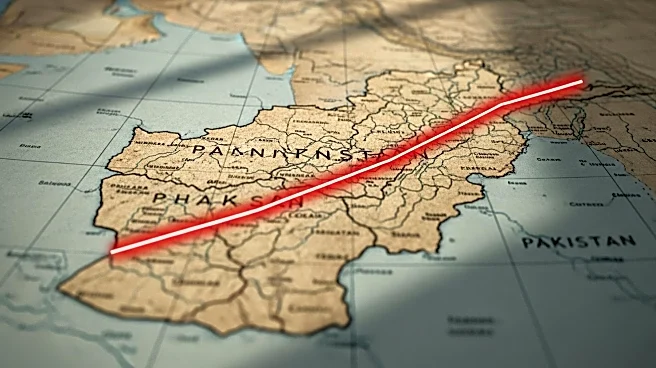What's Happening?
Afghanistan's Interim Foreign Minister, Amir Khan Muttaqi, has issued a warning to Pakistan regarding recent airstrikes conducted by the Pakistan Air Force (PAF) in Afghanistan. The strikes reportedly targeted areas in Kabul and Paktika, including a civilian market near the Durand Line. The Afghan Defense Ministry condemned these actions as violations of Afghanistan's sovereignty, labeling them unprecedented and reprehensible. The strikes are believed to have targeted hideouts of the Tehrik-i-Taliban Pakistan (TTP), following a series of terrorist attacks in Pakistan's Khyber Pakhtunkhwa region. Pakistan has accused Afghanistan of providing safe havens to TTP militants, while Afghanistan has denied these claims. The situation has escalated tensions between the two countries, with Afghanistan warning Pakistan to learn from the historical consequences faced by the US, NATO, and the Soviet Union in Afghanistan.
Why It's Important?
The airstrikes and subsequent diplomatic tensions between Afghanistan and Pakistan have significant implications for regional stability. The accusations of Afghanistan providing safe havens to TTP militants could further strain relations, impacting security and cooperation in the region. The historical reference to the US, NATO, and Soviet Union's experiences in Afghanistan serves as a cautionary tale, highlighting the potential for prolonged conflict and instability. The situation could affect international relations, with countries like India being mentioned as having a role in the ongoing tensions. The escalation may also impact economic and security policies, as both nations navigate the complex geopolitical landscape.
What's Next?
The ongoing tensions between Afghanistan and Pakistan may lead to further diplomatic engagements or military actions. Afghanistan's warning suggests potential retaliatory measures if Pakistan continues its airstrikes. The international community may become involved, urging both nations to resolve their differences through dialogue. The situation could also prompt discussions on border security and counterterrorism efforts, with potential implications for regional alliances and partnerships. Monitoring developments in the region will be crucial for understanding the broader impact on South Asian geopolitics.
Beyond the Headlines
The conflict between Afghanistan and Pakistan highlights deeper issues related to sovereignty, territorial integrity, and the role of non-state actors in regional conflicts. The accusations of external influence, particularly involving India, add a layer of complexity to the situation. The historical context of foreign interventions in Afghanistan underscores the challenges of achieving lasting peace and stability. The situation may also influence public opinion and policy decisions in both countries, as leaders navigate the delicate balance between national security and diplomatic relations.









